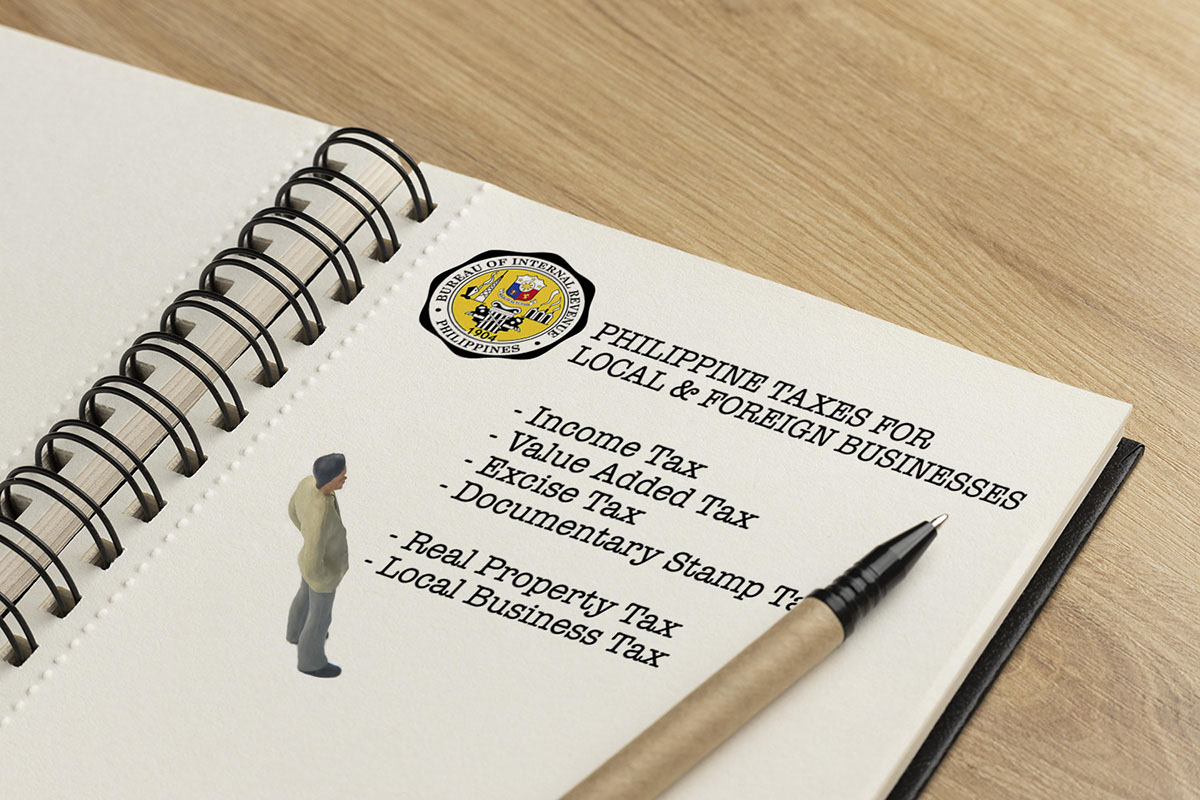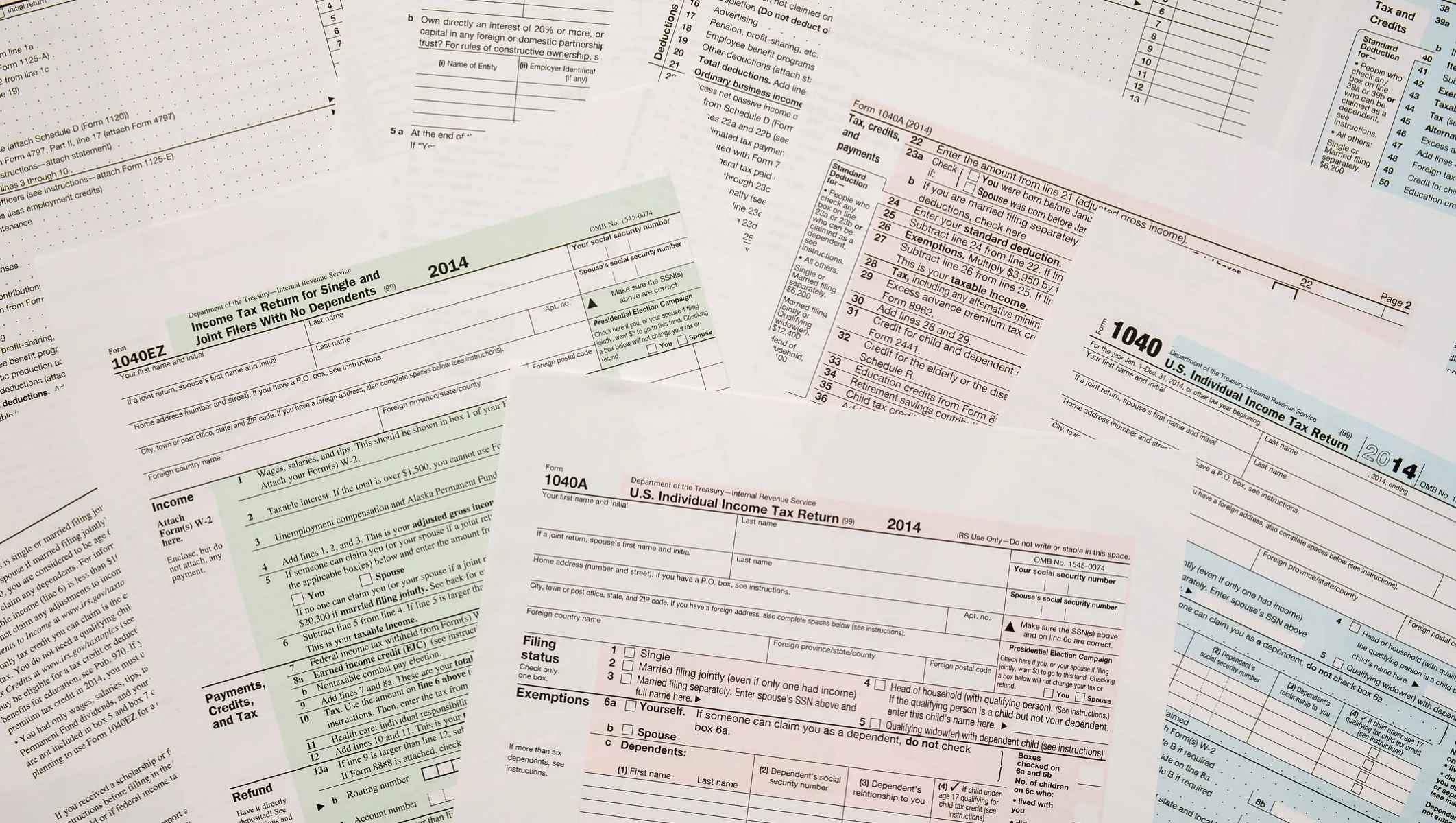Home>Finance>What Documents Are Needed For Small Business Taxes


Finance
What Documents Are Needed For Small Business Taxes
Published: November 25, 2023
Learn what documents you need to gather for small business taxes and ensure a smooth financial filing process. Simplify finance and maximize your deductions.
(Many of the links in this article redirect to a specific reviewed product. Your purchase of these products through affiliate links helps to generate commission for LiveWell, at no extra cost. Learn more)
Table of Contents
- Introduction
- Determining Tax Filing Obligations
- Business Income and Expense Records
- 1099s and Other Income Statements
- Business Entity Formation Documents
- Employer Identification Number (EIN)
- Employee Payroll Records
- Sales and Use Tax Records
- Business Asset Purchases and Depreciation Records
- Business Loan and Credit Card Statements
- Home Office Deduction Records
- Health Insurance Premiums
- Estimated Tax Payments
- Foreign Income and Assets
- Recordkeeping and Document Retention Guidelines
- Conclusion
Introduction
When it comes to small business taxes, keeping proper documentation is crucial. Not only does it ensure that you comply with tax laws and regulations, but it also helps you maximize deductions, minimize errors, and effectively manage your finances. Whether you’re a sole proprietor or the owner of a small corporation, having the right documents on hand can make the tax filing process smoother and less stressful.
In this article, we’ll explore the essential documents you need to gather and maintain for your small business taxes. From income and expense records to employee payroll records, we’ll cover the key paperwork that will help you accurately report your tax obligations and take advantage of potential deductions.
It’s important to note that the specific documentation requirements may vary depending on your business structure, industry, and location. Consulting with a tax professional or utilizing accounting software can help you navigate the complexities and ensure compliance with local tax laws.
Now let’s dive into the documents required for small business taxes and learn how they can impact your tax obligations and financial success.
Determining Tax Filing Obligations
Before diving into the specific documents needed for small business taxes, it’s important to determine your tax filing obligations. This will depend on your business structure and revenue generated. Here are the common types of tax returns small businesses may need to file:
- Sole Proprietorship: If you operate as a sole proprietor, you’ll report your business income and expenses on Schedule C as part of your personal tax return (Form 1040).
- Partnership: Partnerships are required to file an annual information return (Form 1065) and provide each partner with a Schedule K-1, which outlines their respective share of income, deductions, and credits.
- Corporation: C corporations must file Form 1120, while S corporations file Form 1120S. Both require a separate tax return from their owners’ personal returns.
- Limited Liability Company (LLC): The tax requirements for an LLC depend on how it’s classified for tax purposes. An LLC can be treated as a sole proprietorship, partnership, or corporation.
Once you’ve determined your tax filing obligations, you can begin organizing the necessary documents to report your income and expenses accurately.
In the following sections, we’ll cover the essential documents for small business taxes. It’s worth noting that these requirements can vary, so consult with a tax professional to ensure you’re meeting your specific obligations.
Business Income and Expense Records
Accurate and detailed records of your business income and expenses are fundamental for filing your taxes. These records provide the foundation for calculating your taxable income and claiming deductions. Here are the key documents you should maintain:
- Sales Invoices and Receipts: Keep a record of all sales made, including invoices issued and receipts received from customers. This documentation serves as proof of your business revenue.
- Purchase Invoices and Receipts: Similarly, maintain records of all purchases made for your business, such as inventory, equipment, or supplies. These invoices and receipts substantiate your business expenses.
- Bank and Credit Card Statements: Regularly reconcile your business bank accounts and credit card statements. These documents provide a comprehensive overview of your financial transactions and serve as additional proof of income and expenses.
- Cancelled Checks and Payment Records: Keep copies of cancelled checks or electronic payment records that demonstrate payment for business-related expenses, such as rent, utilities, insurance, and professional services. These documents validate your deductible expenses.
- Business Travel and Entertainment Records: If you incur travel or entertainment expenses for business purposes, maintain records such as receipts, lodging invoices, and meal receipts. It’s essential to document the business purpose and attendees.
To streamline the process, consider using accounting software to record and track income and expenses automatically. This can save time and ensure accuracy in your financial records. Additionally, it’s recommended to keep digital copies of all paper documents to avoid loss or damage.
Remember, maintaining organized and up-to-date business income and expense records is not only critical for tax purposes but also provides valuable insights into your company’s financial health and profitability.
1099s and Other Income Statements
If you receive income from sources other than your regular business revenue, such as freelance work or rental income, you may receive various tax forms or statements that need to be reported. Here are some important documents to be aware of:
- 1099-MISC: This form is used to report income received as an independent contractor or freelancer. If you provide services to other businesses and earn $600 or more in a tax year, the company paying you is required to issue a 1099-MISC form.
- 1099-K: If you accept payments through third-party payment processors, such as PayPal or Stripe, you may receive a 1099-K form. This document summarizes the total payment transactions for the year.
- Rental Income Statements: If you rent out properties, you need to keep records of rental income received. This includes rent payments and any additional income from services or utilities provided to tenants.
- Interest and Dividend Statements: If you earn interest or dividends from financial accounts, such as savings accounts, stocks, or bonds, you will receive statements from the institutions detailing your earnings.
- Retirement Account Statements: If you have a retirement account, such as an Individual Retirement Account (IRA) or a 401(k), you will receive statements reporting contributions, distributions, and investment gains or losses.
It’s important to review these income statements and ensure their accuracy. If you notice any discrepancies, reach out to the issuer for clarification or correction. These documents must be reported on your tax return, and failing to include them can lead to penalties or an audit.
Keeping track of these various income statements and integrating them into your overall tax documentation is crucial for accurately calculating your taxable income and ensuring compliance with IRS regulations.
Business Entity Formation Documents
For small businesses, the entity formation documents are essential for establishing and maintaining the legal structure of the business. These documents serve as evidence of your business structure and ownership. The specific documents required will depend on the type of business entity you have.
Here are the key formation documents for common types of small business entities:
- Sole Proprietorship: As a sole proprietor, you aren’t required to file specific formation documents. However, it’s important to have records of any registrations, permits, or licenses obtained for your business.
- Partnership: If you operate as a partnership, the partnership agreement outlines the rights and responsibilities of each partner. It’s crucial to have a copy of this agreement, as well as any amendments made over time.
- Limited Liability Company (LLC): As an LLC, you’ll need the Articles of Organization, which are filed with your state’s Secretary of State office. Additionally, you should have an Operating Agreement that outlines the internal aspects of your business.
- Corporation: If you have a corporation, you’ll have Articles of Incorporation documenting the establishment of your company. Additionally, maintain copies of corporate bylaws, which outline the internal rules and regulations governing the corporation.
These formation documents may need to be provided when registering your business, applying for loans or credit, or undergoing audits or inspections. It’s essential to keep these documents in a safe and accessible location.
If you work with an attorney or a business formation service, they can assist with preparing and filing these formation documents. It’s important to consult with legal professionals to ensure compliance with local laws and regulations regarding business entity formation.
Employer Identification Number (EIN)
An Employer Identification Number (EIN) is a unique nine-digit number issued by the Internal Revenue Service (IRS) to identify your business for tax purposes. It is commonly referred to as a business’s “social security number.” Obtaining an EIN is necessary for several reasons, including hiring employees, opening business bank accounts, and filing tax returns.
Here’s what you need to know about the EIN:
- Application Process: Applying for an EIN is relatively straightforward. You can do it online through the IRS website or by mail using Form SS-4. The application requires basic information about your business, such as its legal name, business structure, and purpose.
- Sole Proprietorship: While not required, obtaining an EIN is recommended for sole proprietors. It helps separate your personal and business tax obligations and provides an additional layer of privacy by using your EIN instead of your Social Security Number on forms and documents.
- Hiring Employees: If you plan to hire employees, an EIN is mandatory. It is used for reporting employment taxes, withholding income tax, and paying payroll taxes. It also helps ensure accurate identification when submitting W-2 forms to employees and the IRS.
- Opening Bank Accounts: Banks typically require an EIN to open a business bank account. It allows for clear separation between personal and business finances, streamlining recordkeeping and ensuring accurate reporting.
- Tax Filings: Your EIN will be used on all tax-related forms and correspondence with the IRS. This includes filing your business tax return (such as Form 1120 or Schedule C), issuing 1099 forms to contractors, and submitting payroll tax filings.
Once you receive your EIN, it’s important to keep it safe and easily accessible. You’ll need to provide it whenever requested by the IRS, banks, or other entities requiring your business identification.
Remember that an EIN is specific to your business and should not be used for personal matters. If your business structure changes or you no longer need an EIN, notify the IRS to ensure compliance.
Obtaining an EIN is a crucial step in establishing your business’s identity and fulfilling your tax obligations. It simplifies various administrative processes and helps ensure accurate reporting and compliance with IRS regulations.
Employee Payroll Records
If your small business has employees, you have the responsibility of maintaining accurate and detailed payroll records. These documents are essential for a variety of reasons, including tax reporting, compliance with employment laws, and providing your employees with the necessary information about their earnings.
Here are the key employee payroll records you should maintain:
- Employee Details: Keep records of each employee, including their full name, Social Security Number, address, date of hire, and employment status (full-time, part-time, or contractor).
- Time and Attendance Records: Track the hours worked by each employee, including regular hours, overtime, and any paid time off taken. This can be done through timesheets, punch-in systems, or time-tracking software.
- Pay Stubs: Provide employees with pay stubs that detail their earnings for each pay period. This includes gross wages, deductions for taxes, insurance, retirement contributions, and net pay.
- Payroll Tax Records: Maintain records of all payroll taxes withheld from employee wages, such as federal income tax, Social Security taxes, Medicare taxes, and state or local taxes. These records are essential for tax reporting and compliance.
- W-4 Forms: Keep copies of employees’ completed W-4 forms, which determine the amount of federal income tax to withhold from their paychecks. Update these forms when employees have changes in their tax withholding status.
- Benefits and Deductions: Document any employee benefits, such as health insurance, retirement plans, and voluntary deductions like employee contributions to a flexible spending account or charitable donations.
- Form W-2: At the end of the year, provide each employee with a Form W-2, which summarizes their earnings and tax withholdings for the year. File copies of these forms with the Social Security Administration and applicable state agencies.
It’s crucial to keep these records organized and readily accessible. In some cases, you may be required to retain payroll records for a specific period, such as three years, so consult with tax and legal experts to ensure compliance.
Using efficient payroll software can simplify the process of recording and managing payroll information. These tools can automate calculations, generate pay stubs, and help ensure accurate tax withholding and reporting.
Sound payroll recordkeeping not only fulfills legal requirements but also provides crucial information for managing your business’s financial health and meeting your obligations as an employer.
Sales and Use Tax Records
If your small business collects sales tax from customers or pays use tax on purchases, it’s essential to maintain accurate records of these transactions. Sales and use tax records are necessary for demonstrating compliance with tax laws and regulations. These documents serve as evidence of the sales made and taxes collected or paid.
Here are the key sales and use tax records you should maintain:
- Sales Invoices: Keep copies of sales invoices that show the details of each sale, including the customer’s name, date of purchase, item or service sold, and the amount of sales tax collected.
- Sales Receipts: If you operate a cash-based business or issue receipts to customers, retain copies of these receipts as they serve as proof of the transaction, including the amount of sales tax collected.
- Sales Tax Returns: File sales tax returns regularly, reporting the sales tax you have collected from customers. Keep copies of these returns for your records, along with any supporting documentation.
- Exemption Certificates: If a customer claims a sales tax exemption, maintain the necessary documentation, such as a valid resale certificate or exemption certificate, showing that the transaction is exempt from sales tax.
- Use Tax Documentation: Keep records of any purchases you make where sales tax was not collected by the seller. This includes invoices or receipts showing the purchase details and the use tax paid directly to the taxing authority.
- Audit Documentation: Maintain all supporting documents for sales and use tax audits, including sales records, purchase invoices, exemption certificates, and any correspondence with tax authorities.
Proper recordkeeping for sales and use tax is crucial for accurate reporting and compliance with tax laws. It also helps you reconcile your sales transactions, identify any discrepancies, and respond to any audits or inquiries from tax authorities.
Consider using accounting software or specialized sales tax management tools to automate the calculation and tracking of sales tax. These tools can help ensure accurate reporting, minimize errors, and streamline the sales and use tax recordkeeping process.
Remember, sales and use tax regulations can vary among different jurisdictions, so consult with a tax professional or review the specific rules in your area to ensure your records are complete and compliant.
Business Asset Purchases and Depreciation Records
As a small business owner, it’s important to keep track of your business assets and their associated purchases. Tracking these records not only helps you manage your assets effectively but also ensures accurate calculation of depreciation for tax purposes.
Here are the key points to consider regarding business asset purchases and depreciation records:
- Asset Purchase Records: Maintain detailed records of all business asset purchases, including invoices, receipts, and purchase agreements. These documents should specify the date of purchase, the description and cost of the asset, and the vendor’s information.
- Asset Descriptions: Include essential details about each asset, such as serial numbers, model numbers, and any other identifying information. This helps differentiate between similar assets and provides information for maintenance and service purposes.
- Capitalization Thresholds: Familiarize yourself with the capitalization thresholds set by the tax authorities. These thresholds determine whether an asset can be expensed immediately or needs to be capitalized and depreciated over its useful life.
- Depreciation Method: Choose an appropriate depreciation method for your assets, such as the straight-line method or accelerated depreciation methods like MACRS (Modified Accelerated Cost Recovery System). Consult with a tax professional to determine the most suitable method for your business.
- Depreciation Schedules: Create depreciation schedules for each asset, outlining the depreciation expense for each year over the asset’s useful life. This schedule helps track the accumulated depreciation and the book value of the asset.
- Disposals and Retirements: Keep records of asset disposals or retirements, including sale details, scrapping information, or any other form of removal from your business. These records are important for tax purposes and help adjust the depreciation schedule accordingly.
- Improvement and Maintenance Expenses: Maintain records for any improvement costs or significant repairs made to the assets. These expenses may be capitalized and added to the asset’s value to determine the new depreciation basis.
Properly tracking your business assets and their depreciation ensures accurate financial reporting and tax compliance. It allows you to claim appropriate deductions and helps with future asset planning and budgeting. Consider utilizing asset management software or features in your accounting system to streamline the management and tracking of your business assets.
Remember to consult with a tax professional or accountant for guidance on depreciation methods, compliance with applicable tax laws, and the specific depreciation rules for your assets.
Business Loan and Credit Card Statements
If your small business has taken out loans or uses credit cards for business expenses, it’s crucial to maintain accurate records of your loan and credit card statements. These records serve as evidence of your business’s financial transactions and are necessary for tax reporting, expense tracking, and financial analysis.
- Loan Statements: Keep copies of all loan statements, including the original loan agreement, repayment terms, and monthly statements. These documents provide a clear record of your loan balance, interest payments, and principal repayments.
- Credit Card Statements: Retain credit card statements that show the details of your business expenses. These statements are crucial for categorizing and tracking your business expenses, ensuring accurate deduction claims, and reconciling your financial records.
- Expense Documentation: Attach supporting documents, such as receipts or invoices, for each expense listed on the loan or credit card statement. These documents validate the business purpose of the expense and provide evidence for deductions or reimbursements.
- Interest Charges: Highlight and track any interest charges incurred on loans or credit card balances. The interest expense on business loans is typically deductible, while interest on personal expenses or personal use of credit cards is not.
- Repayment Records: Maintain records of loan payments made, including canceled checks, electronic payment confirmation, or bank statements. These records demonstrate your loan repayments and help track the reduction of your loan balance over time.
- Balance Transfers or Cash Advances: If you perform any balance transfers or cash advances from your credit card, keep records of these transactions to accurately account for them in your financial statements.
- Annual Statements or Summaries: Some lenders or credit card issuers provide annual summaries or statements of account activity. These documents can be useful for reviewing the overall financial health of your business and for tax preparation purposes.
Keeping organized loan and credit card statements is essential not only for accurate financial recordkeeping but also for ensuring you claim all eligible deductions and expenses when filing your taxes. Additionally, maintaining these records allows you to analyze your business’s financial performance, monitor spending trends, and plan for future loan or credit needs.
Consider utilizing accounting software or expense tracking tools that can help you streamline the tracking and categorization of your loan and credit card expenses. These tools can automate data entry, provide reports, and simplify the reconciliation process.
Remember, proper recordkeeping of loan and credit card statements ensures transparency, compliance, and better financial management for your small business.
Home Office Deduction Records
If you operate your small business from a home office, you may be eligible for a home office deduction on your taxes. To claim this deduction, it’s essential to maintain accurate records specific to your home office expenses. These records support your claim and help ensure compliance with IRS guidelines.
- Office Expenses Documentation: Keep records of all expenses related to your home office, such as utility bills, rent or mortgage payments, property taxes, and homeowners or renters insurance. These records should clearly indicate the portions that directly relate to your home office.
- Measurements and Diagrams: Document the size of your home office space, including the square footage dedicated to your business activities. Detailed measurements and diagrams can help substantiate the percentage of your home used for business purposes.
- Receipts and Invoices: Retain receipts for any office-related expenses, such as office supplies, furniture, equipment, and repairs. These receipts serve as evidence of your expenses and support the deduction you claim.
- Cell Phone and Internet Bills: If you use your personal phone or internet service for business purposes, keep records of these bills. You may be able to deduct a portion of these expenses based on the percentage of business use.
- Depreciation Records: If you own your home, maintain records related to the depreciation of your home and the portion allocated to your home office. Depreciation records help determine the amount you can deduct for the wear and tear of your home.
- Form 8829: Complete and retain Form 8829, the IRS form specific to claiming the home office deduction. This form calculates the allowable deduction based on your home office expenses and provides a clear audit trail if necessary.
Remember that the home office deduction has specific requirements, including exclusivity and regular use of the designated space for business purposes. Familiarize yourself with the IRS guidelines or consult with a tax professional to ensure you meet all the criteria.
Proper recordkeeping for the home office deduction not only supports your tax claim but also demonstrates your commitment to complying with tax regulations. It’s essential to maintain organized and detailed records to substantiate your deductions and defend them in case of an audit.
Consider utilizing accounting software or expense tracking tools to streamline the recordkeeping process. These tools can help you categorize expenses, track business-related purchases, and generate reports specifically for your home office.
By maintaining accurate and comprehensive home office deduction records, you can maximize your tax benefits while ensuring compliance with IRS regulations.
Health Insurance Premiums
As a small business owner, if you provide health insurance coverage to yourself, your employees, or their dependents, you may be eligible to claim deductions for health insurance premiums. These deductions can help reduce your taxable income and provide financial relief. To ensure you claim the appropriate deductions, it’s crucial to keep accurate records of health insurance premiums paid.
- Premium Payment Records: Keep records of all health insurance premium payments made for yourself and your employees. This includes invoices, receipts, and statements from insurance providers.
- Employee Enrollment Forms: Maintain copies of employee health insurance enrollment forms that document their participation in the health insurance plan.
- Record of Premium Contributions: If employees contribute to their health insurance premiums through payroll deductions, retain records of the amounts withheld from their paychecks for insurance coverage.
- COBRA Coverage: If you offer COBRA continuation coverage to former employees, keep records of the premiums paid by the individuals to continue their health insurance coverage.
- Summary of Benefits: Request and retain a summary of benefits from your insurance provider that outlines the coverage provided by the health insurance plan.
It’s crucial to note that the rules and limitations for deducting health insurance premiums can vary depending on your business structure, the number of employees, and other factors. Consult with a tax professional to understand the specific deductions available to you and to ensure compliance with tax laws and regulations.
Proper recordkeeping of health insurance premiums gives you the ability to accurately report deductions and provide evidence in case of an audit. It’s recommended to maintain both digital and physical copies of all relevant documents for easy access and safekeeping.
Remember to review IRS guidelines and consult with a tax professional to stay informed about the specific requirements and limitations regarding health insurance premium deductions for your small business.
Estimated Tax Payments
As a small business owner, it’s important to stay on top of your tax obligations throughout the year. One critical aspect of tax planning is making estimated tax payments. Estimated tax payments are periodic payments made in advance to cover your expected tax liability for the current tax year. Keeping accurate records of these payments is essential for tax compliance and avoiding underpayment penalties.
- Payment Documentation: Maintain records of all estimated tax payments made, including payment dates, amounts, and method of payment. This can include payment receipts, bank statements, or confirmation emails.
- Estimated Tax Payment Vouchers: If you make estimated tax payments using IRS-provided payment vouchers (Form 1040-ES), keep copies of these vouchers for your records. The vouchers provide a breakdown of the payment amounts allocated to different tax categories.
- Payment Confirmation: Retain any confirmation numbers or receipts received upon making electronic estimated tax payments. These confirmations serve as proof of payment and can be useful in case of any discrepancies or questions.
- Quarterly Tax Return Forms: When filing your quarterly tax returns (Form 941 or Form 1120-W), keep records of the calculated estimated tax liability and any adjustments made based on payments made during the quarter.
- Estimated Tax Worksheets: Utilize estimated tax calculation worksheets or electronic tools provided by the IRS to help determine the appropriate amount of estimated tax payments.
Maintaining accurate records of estimated tax payments is crucial for several reasons. It helps ensure that you meet your tax obligations, avoid underpayment penalties, and provides a clear audit trail in case of a tax audit. Additionally, these records provide valuable insights into your business’s cash flow and financial planning.
Consider utilizing accounting software or tax preparation software that can help you calculate and track your estimated tax payments. These tools can automate the calculations, generate payment vouchers, and provide reminders for upcoming payment due dates.
Remember to consult with a tax professional or utilize the resources provided by the IRS to determine the appropriate estimated tax payment amounts and to ensure compliance with tax laws and regulations specific to your business.
Foreign Income and Assets
If your small business generates income from foreign sources or if you have foreign assets, it is important to properly manage and report these to ensure compliance with tax laws and regulations. Keeping accurate records of foreign income and assets is crucial in fulfilling your tax obligations and avoiding potential penalties. Here are some key points to consider:
- Foreign Income Documentation: Maintain records of all foreign income earned by your business, including invoices, receipts, bank statements, or other relevant financial documents. These documents should clearly indicate the nature and source of the income.
- Foreign Asset Records: Keep detailed records of any foreign assets owned by your business, such as properties, bank accounts, or investments. Include documentation regarding the acquisition, ownership, and disposition of these assets.
- Foreign Bank Account Reports: If your business has foreign bank accounts, be aware of the reporting requirements for these accounts. The Report of Foreign Bank and Financial Accounts (FBAR) and Form 8938 may need to be filed to disclose these accounts to the IRS.
- Foreign Tax Credit Documentation: If your business is subject to foreign taxes, maintain records of any taxes paid to foreign governments. These records are essential for claiming foreign tax credits and avoiding double taxation.
- Transfer Pricing Documentation: For businesses with intercompany transactions involving related foreign entities, maintain transfer pricing documentation that supports the arm’s length nature of these transactions.
- Treaty Compliance: If your business operates in a country with a tax treaty with the United States, be familiar with the provisions of the treaty and maintain records that demonstrate compliance with its requirements.
It is important to consult with a tax professional who specializes in international tax matters to ensure that you fully understand and comply with the complex rules and regulations related to foreign income and assets. They can provide guidance on reporting requirements, tax treaties, and available deductions or credits.
Keeping detailed and organized records of foreign income and assets not only helps with tax compliance but also allows for better financial planning and analysis of your business’s international operations. Utilizing accounting software or specialized tools for international tax management can simplify the recordkeeping process and ensure accuracy, particularly when dealing with multiple currencies or complex transactions.
Remember, maintaining accurate records and staying informed about the tax regulations pertaining to foreign income and assets is essential to avoid penalties and ensure the smooth operation of your small business in the global marketplace.
Recordkeeping and Document Retention Guidelines
Proper recordkeeping is vital for small businesses to accurately report financial information, meet regulatory requirements, and simplify tax filing processes. Establishing effective document retention guidelines ensures that your business maintains organized and accessible records. Here are key considerations for recordkeeping and document retention:
- Retention Periods: Familiarize yourself with legal requirements and retention periods for various types of records. Different documents may have distinct retention periods, such as tax records, financial statements, employee records, and contracts. Consult with a legal or tax professional to determine the specific requirements for your business.
- Organized Filing Systems: Implement a structured filing system that allows for easy categorization, retrieval, and storage of documents. Use clearly labeled folders, both physical and digital, to maintain organized records.
- Digital Recordkeeping: Leverage electronic document management systems or cloud storage solutions to digitize and store important records. Implement appropriate security measures to protect sensitive information.
- Backup and Redundancy: Regularly back up your electronic records to prevent data loss. Consider using multiple storage locations or cloud backups to ensure redundancy.
- Document Destruction: Establish a process for timely and secure destruction of expired or irrelevant records. Ensure compliance with any regulations regarding the proper disposal of sensitive information to maintain data security.
- Consistency and Regularity: Make recordkeeping a routine part of your business operations. Regularly update your records, ensure accuracy, and maintain consistency in your filing practices.
- Document Accessibility: Maintain records in a format that allows for easy access and retrieval when needed. Consider implementing detailed indexing or tagging systems to facilitate quick document searches.
- Employee Training: Educate your employees on recordkeeping policies and procedures. Ensure they understand the importance of accurate and timely documentation and their role in maintaining organized records.
- Consult with Professionals: When in doubt, seek advice from professionals such as accountants, tax advisors, or legal experts who are well-versed in recordkeeping requirements and best practices.
By following these guidelines, you can establish a robust recordkeeping system that allows for efficient retrieval, accurate reporting, and compliance with legal and regulatory requirements. Proper recordkeeping not only simplifies your day-to-day business operations but also provides a solid foundation for informed decision-making and financial planning.
Remember that recordkeeping practices may vary depending on your industry, location, and specific business needs. Stay informed about any changes in regulations and adjust your recordkeeping guidelines accordingly to ensure ongoing compliance.
Conclusion
Proper recordkeeping is paramount for small businesses to thrive financially, comply with tax laws, and effectively manage their operations. By maintaining accurate and organized records, you can simplify tax preparation, maximize deductions, and provide transparency in the event of an audit. From documenting income and expenses to keeping track of important business documents, each record serves a purpose in ensuring the smooth functioning of your business.
Throughout this article, we have explored the essential documents and records needed for different aspects of your small business taxes, including income and expense records, employee payroll records, and documentation related to entity formation, foreign income, and assets. We have emphasized the importance of maintaining thorough and updated records for various areas of your business to ensure compliance and make informed financial decisions.
Remember, accurate recordkeeping goes beyond just meeting legal obligations and tax requirements. It provides you with valuable insights into your business’s financial health, profitability, and growth potential. The key is to establish a consistent and organized approach to recordkeeping, utilizing both physical and digital systems, while ensuring proper document retention and disposal practices.
Consulting with professionals, such as accountants, tax advisors, and legal experts, can provide invaluable guidance tailored to your specific business needs. They can help you navigate complex tax regulations, optimize your recordkeeping processes, and ensure compliance with applicable laws.
By taking recordkeeping seriously and implementing effective practices, you can streamline your business operations, minimize errors, and position your business for long-term success. Don’t underestimate the power of accurate recordkeeping – it is a fundamental aspect of financial management that can pave the way for growth and prosperity.














